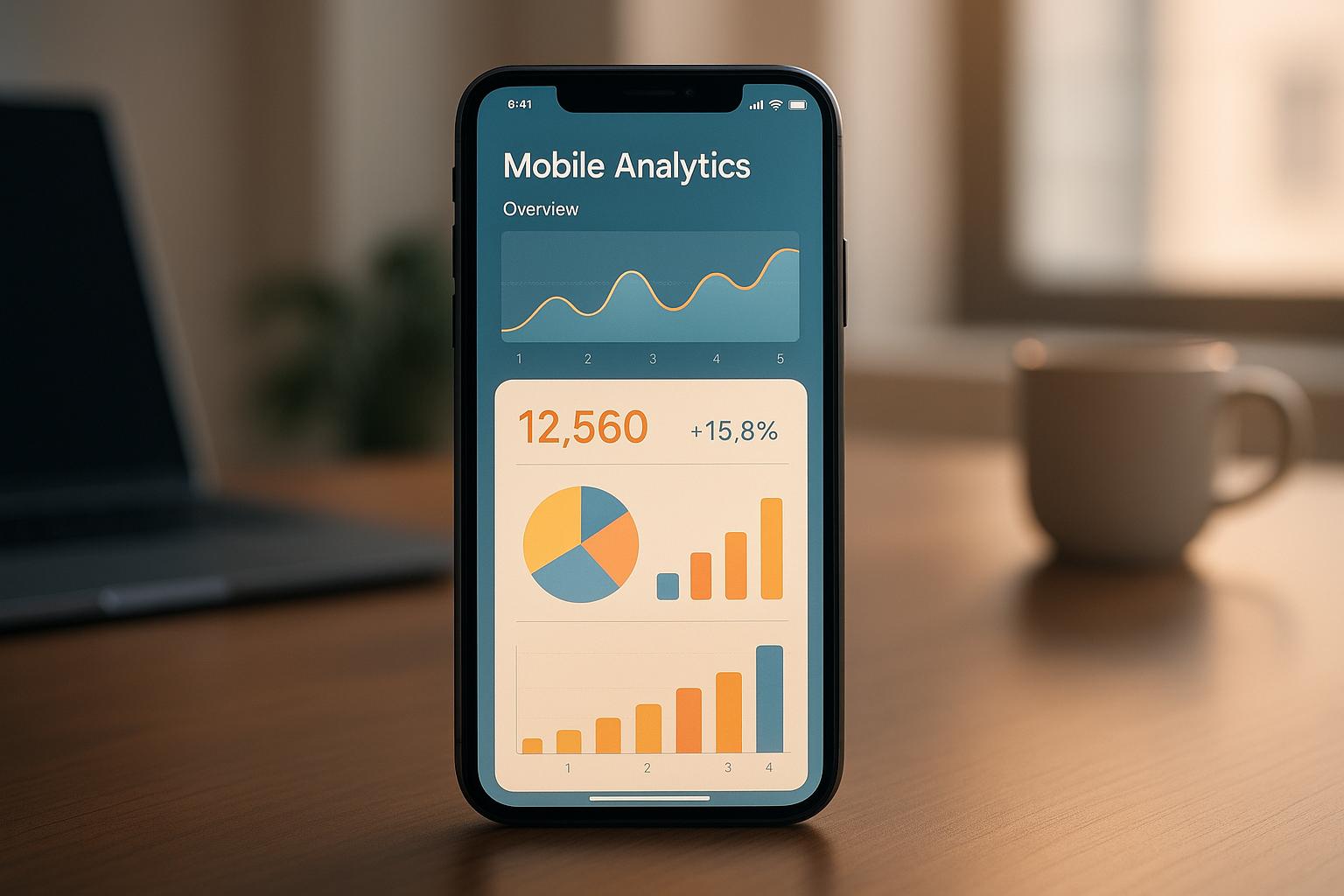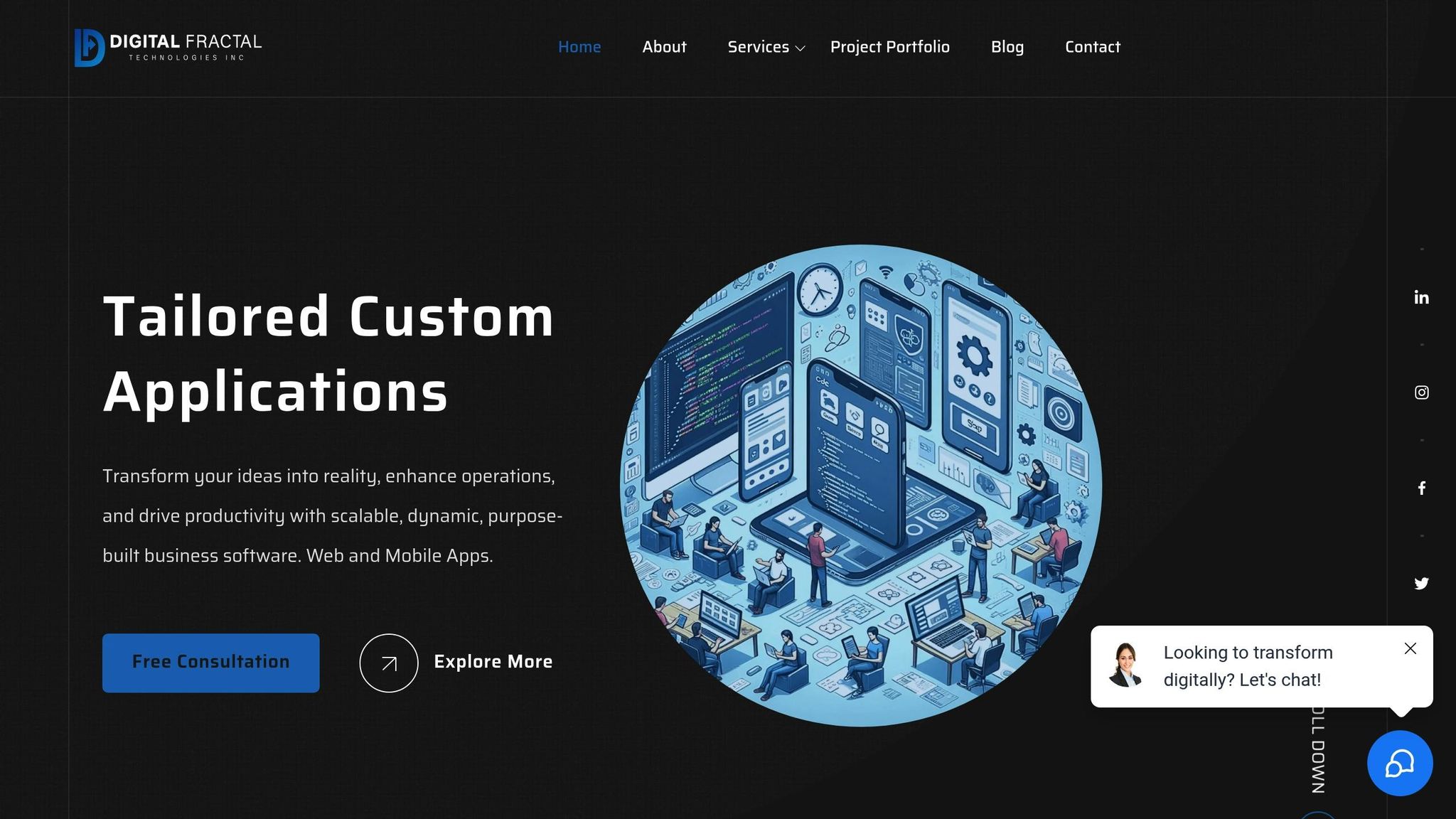
AI-Powered Mobile App Analytics: Key Benefits | Digital Fractal
AI-powered mobile app analytics transform how Canadian businesses manage app performance and user experiences. These systems use machine learning to predict issues, detect anomalies in real-time, and optimize app functionality based on user behaviour and local conditions. Here’s why they matter:
- Proactive Issue Detection: Predict crashes, slowdowns, and inefficiencies before users experience them.
- Improved User Experience: Tailor app performance to Canadian preferences (e.g., bilingual support, CAD currency, YYYY-MM-DD dates).
- Cost Efficiency: Automate performance monitoring, reducing downtime and operational costs.
- Enhanced Retention: Deliver personalized experiences to keep users engaged and reduce churn.
- Compliance Support: Simplify adherence to Canadian data privacy laws like PIPEDA and provincial regulations.
For businesses in Canada, these tools offer a practical way to maintain app reliability, meet user expectations, and stay competitive in an increasingly digital market.
My app analytics process (real numbers 👀+ quick tutorial)
Common Mobile App Performance Issues
Performance problems can quickly turn happy users into frustrated ones, and for Canadian businesses, this often translates to lost revenue and diminished customer loyalty. With users in Canada expecting seamless digital experiences, let’s explore some of the most common mobile app performance challenges and their direct impact on business outcomes.
Slow Load Times and Their Business Impact
Slow load times are one of the biggest deal-breakers for app users. If an app takes more than three seconds to load, 53% of users abandon it. For Canadian businesses, this is a major concern, especially since users here are accustomed to fast internet speeds and expect apps to perform just as quickly.
Every additional second of delay chips away at user satisfaction and conversion rates. This becomes especially critical during high-traffic periods like Black Friday or Boxing Day sales, where even minor lags can lead to significant revenue losses. Retail apps in Canada face added pressure during these times, as slow performance can drive users to competitors.
The problem is further compounded by Canada’s diverse network conditions. While urban areas may enjoy strong connectivity, rural regions often face slower and less reliable networks. This makes unoptimized assets and sluggish server responses even more noticeable – and frustrating – for users.
There’s also a ripple effect. Apps with slow performance tend to attract negative reviews, which hurt their rankings in app stores. Lower visibility means fewer organic downloads, forcing businesses to spend more on user acquisition. And when users encounter slow load times, they’re far less likely to recommend the app to others, cutting off the word-of-mouth marketing that many Canadian businesses rely on.
App Crashes and Instability
App crashes are another major red flag for users. Research shows that up to 70% of uninstalls in some app categories are due to crashes. For Canadian businesses aiming to build long-term customer relationships, this is a serious challenge.
The financial impact of crashes goes beyond the immediate loss of a session. Each crash risks losing a customer permanently, especially in competitive industries like banking or e-commerce, where users can easily switch to more reliable alternatives.
Crashes don’t just alienate users – they also hurt app visibility. App store algorithms penalize apps with high crash rates, reducing their rankings and making them harder to discover organically. This creates a snowball effect: technical issues lead to poor rankings, which drive up the cost of acquiring new users.
As one manager, Justin N., put it:
"What impressed me the most with Digital Fractal is when issues arose, not only were they diagnosed in a timely fashion, but they also executed on solutions that ensured we would never encounter the same problem twice – future proofing our technology."
This highlights the importance of not just addressing crashes but preventing them from recurring.
Resource Inefficiency and User Experience
Beyond crashes, resource inefficiency – like excessive battery drain, high memory usage, and heavy data consumption – can be just as damaging to user trust. Surveys reveal that 30% of users delete apps due to resource inefficiency. For Canadians, who often face higher mobile data costs compared to other countries, apps with poor resource management are a dealbreaker.
Battery drain creates a frustrating choice for users: stick with your app or save their device’s battery life for other tasks. Similarly, inefficient memory usage can slow down the entire device, creating annoyance that extends beyond your app. These issues aren’t just momentary inconveniences – they leave a lasting negative impression.
Data consumption is especially sensitive in Canada, where many users have limited data plans. Apps that consume too much data risk being uninstalled as users try to stay within their monthly allowances. For businesses, this means losing users not because of the app’s functionality, but due to its inefficiency.
Unlike crashes or slow load times, resource inefficiency is a problem that lingers. Users might forgive one-off issues if they’re resolved quickly, but constant battery drain or excessive data use creates daily frustration. Over time, this erodes user loyalty and damages the overall relationship with your brand.
How AI Analytics Solve Mobile App Performance Problems
AI-powered analytics take a proactive approach to mobile app performance, offering Canadian businesses a way to predict, detect, and resolve issues before they impact users. This is especially important given Canada’s diverse network conditions and varying user expectations.
Predictive Analytics: Staying Ahead of Problems
By using machine learning algorithms, predictive analytics analyses historical data to spot patterns that often lead to app slowdowns or crashes. These systems monitor metrics like memory usage, CPU load, and network response times, identifying early warning signs such as memory leaks or unusual resource usage. When potential issues arise, developers are alerted, allowing them to act before users are affected.
This approach is particularly beneficial for businesses in Canada. For instance, if analytics reveal that users in rural Alberta frequently experience app crashes during evenings due to poor network quality, the system can adjust resource allocation ahead of time. One example from the Canadian retail sector showed a 30% drop in crash rates and better user retention after implementing these predictive models.
Real-Time Anomaly Detection
AI takes performance management a step further with real-time anomaly detection. By continuously monitoring thousands of data points, it can identify unexpected spikes in error rates or latency and respond instantly. This might involve rolling back a problematic update, reallocating server resources, or temporarily disabling a feature to maintain app stability.
This technology is particularly helpful during busy periods, such as Boxing Day or back-to-school sales. It can differentiate between routine traffic surges – like lunchtime usage spikes – and genuine performance issues, ensuring minor glitches don’t spiral into major disruptions.
Context-Aware Optimization Tailored to Canadians
AI-driven context-aware optimization adjusts app performance based on factors like device type, location, network quality, and even user preferences specific to Canada. For example, if someone in northern Ontario uses an older device with limited connectivity, the system might preload key content or lower image quality to ensure smooth operation. Meanwhile, a user in downtown Toronto with a high-speed connection can enjoy the app’s full features.
This adaptive approach has already proven its value in Canada. In October 2020, Deeleeo, a Canadian last-mile delivery app by Digital Fractal Technologies Inc., used context-aware optimization to manage logistics, driver availability, and user requests across the country’s diverse geography, boosting efficiency. Similarly, the Xtreme Oilfield app, developed for a Canadian energy service company, leverages this technology to digitize workflows, automate compliance processes, and facilitate communication via iPads – streamlining operations while meeting regulatory standards.
| Optimization Method | Traditional Analytics | AI-Powered Analytics |
|---|---|---|
| Issue Detection | Reactive (after problems occur) | Predictive and real-time |
| Personalization | Rule-based, static responses | Dynamic, context-sensitive |
| Resource Efficiency | Manual adjustments | Automated and scalable |
| User Retention | Limited insights | Improved through tailored solutions |
sbb-itb-fd1fcab
Key Benefits of AI-Powered Mobile App Analytics
AI-powered analytics offer much more than just tracking app performance. For Canadian businesses, these advanced systems bring measurable improvements in user experience, operational efficiency, and adherence to regulatory standards.
Better User Retention and Engagement
AI-driven analytics are reshaping how businesses connect with their users by delivering real-time, personalized experiences. By analysing user behaviour, preferences, and contextual factors, AI helps create interactions that feel tailored and relevant. According to McKinsey, 71% of customers expect personalized interactions, and 76% become frustrated when these expectations aren’t met.
For Canadian companies, this translates into practical applications like recommending products based on past purchases, sending targeted notifications at optimal times, or adjusting app interfaces to suit user preferences and device capabilities. Imagine a retail app suggesting winter gear to a Winnipeg customer while recommending lighter clothing to someone in Vancouver – this kind of customization, informed by location data and seasonal trends, keeps users engaged and coming back. The result? Lower churn rates and higher retention.
These improvements in user engagement naturally lead to operational efficiencies, which we’ll explore next.
Cost Savings Through Automated Optimization
AI-powered analytics significantly reduce operational costs for Canadian businesses by automating tasks that traditionally required manual intervention. This allows technical teams to focus on strategic projects instead of routine maintenance.
AI systems can monitor performance, detect anomalies, and allocate resources without human involvement. For example, an AI system that identifies and resolves slow load times or prevents crashes before they happen minimizes downtime and reduces support costs. This automation also lowers infrastructure expenses and reduces the need for staffing dedicated to routine monitoring.
The cost savings extend beyond technical operations. AI can automate customer support through chatbots, handle data entry, and manage routine maintenance tasks. With natural language processing, AI-powered chatbots address common user queries, easing the burden on customer service teams while maintaining quality. As businesses grow, these savings scale, making AI a smart long-term investment.
Beyond cost reductions, AI also strengthens security and ensures compliance with regulations.
Better Security and Compliance
For Canadian businesses, navigating complex data privacy laws is a critical challenge. AI-powered analytics enhance security monitoring and streamline compliance management, making these tasks more efficient and reliable. These systems are particularly effective at identifying fraudulent activities, detecting security breaches, and ensuring adherence to regulations like the Personal Information Protection and Electronic Documents Act (PIPEDA).
AI continuously monitors data access, user behaviour, and system activity, flagging unusual patterns that could signal security threats. This enables businesses to respond quickly and effectively to potential breaches.
On the compliance side, AI systems can track data handling practices, manage user consent, and generate reports required by Canadian privacy laws. Automating these processes reduces the risk of human error and helps businesses maintain trust while avoiding legal issues. Companies like Digital Fractal Technologies Inc. have already implemented such solutions for Canadian clients, offering custom applications that meet regulatory standards. Their expertise in integrating machine learning and computer vision technologies ensures businesses stay compliant, especially in heavily regulated sectors like energy and public services.
| Benefit Category | Traditional Approach | AI-Powered Analytics |
|---|---|---|
| User Engagement | Generic, one-size-fits-all | Personalized, context-aware |
| Operational Costs | Manual monitoring, reactive | Automated, proactive optimization |
| Security & Compliance | Periodic audits, manual checks | Continuous monitoring, automated reporting |
| Scalability | Resource-intensive growth | Efficient, automated scaling |
Real-Time Analytics: Best Practices for Canadian Businesses
To effectively implement real-time AI analytics, Canadian businesses must navigate regulatory requirements and adapt to the country’s diverse user conditions.
Compliance with Canadian Data Privacy Laws
Meeting Canada’s data privacy laws starts with securing explicit user consent before collecting personal data. This involves creating clear, easy-to-understand privacy policies and transparent opt-in processes that explain exactly what data is being gathered and how it will be used.
To align with PIPEDA (Personal Information Protection and Electronic Documents Act), businesses should store analytics data within Canada or in regions with equivalent privacy protections. This not only ensures compliance but also reduces latency. Regular audits and employee training are crucial for maintaining adherence to these regulations.
"Boost accountability and data sovereignty with tailored applications that integrate seamlessly into your ecosystem." – Digital Fractal Technologies Inc.
For businesses operating in Quebec, Bill 64 adds another layer of requirements. Navigating these complexities demands expert advice. Staying informed about evolving laws and using modular analytics platforms that can adjust to new regulations is key. Conducting regular impact assessments with legal and compliance teams helps maintain customer trust and avoid potential legal pitfalls.
Localizing Analytics for Canadian Users
Localizing analytics systems for Canadian users means tailoring every detail. Dashboards should display monetary values in CAD (e.g., $1,234.56), use Canadian date formats (DD/MM/YYYY or YYYY-MM-DD), and default to metric units.
Geographic diversity also plays a major role in real-time analytics. Canada spans six time zones, so timestamps must reflect local times, and analytics should account for regional differences in user behaviour. For instance, an e-commerce app might experience peak activity at different times in Toronto compared to Vancouver. Analytics systems need to clearly highlight these regional variations.
In 2023, a Canadian retail app implemented AI-driven real-time analytics with full localization, including currency in CAD and Canadian date formats, while adhering to PIPEDA standards. The results were impressive: an 18% drop in checkout abandonment and a 25% boost in user retention within six months.
These localization strategies lay the groundwork for expert implementation, as explored in the next section.
How Digital Fractal Technologies Inc Supports Canadian Businesses

Digital Fractal Technologies Inc., based in Alberta, specializes in AI analytics solutions designed for Canadian businesses. Their deep understanding of Canada’s regulatory landscape allows them to offer end-to-end support, from initial consultations to ongoing system optimization.
Their approach combines advanced AI services with practical application development, using expertise in data engineering, machine learning, and computer vision. This ensures businesses receive analytics solutions that not only meet current needs but can also adapt to shifting regulations and industry demands.
Digital Fractal’s industry experience is particularly valuable for sectors like public services, construction, and energy, which face unique compliance and operational challenges. For example, in 2024, they developed a solution for a Canadian energy client that automated anomaly detection and compliance reporting. This led to a 30% reduction in app downtime and improved regulatory audit outcomes.
"Develop policies and frameworks to better utilize AI in your business." – Digital Fractal Technologies Inc.
What sets Digital Fractal apart is their partnership model. They integrate their experts directly into client teams, ensuring analytics solutions are tailored to specific business needs and the Canadian market. This collaborative approach helps businesses navigate complex compliance requirements while maximizing the value of real-time analytics.
Conclusion: Transforming Mobile App Performance with AI
AI analytics are reshaping how Canadian businesses monitor and enhance mobile app performance. By integrating these technologies, companies can improve user retention, cut operational costs, and strengthen their position in a competitive market.
With tools like predictive analytics and automated anomaly detection, businesses can address potential issues before they affect users. Context-aware optimization ensures apps run smoothly across Canada’s unique geographic and regulatory environments. Meanwhile, AI-driven personalization has become a cornerstone for keeping users engaged and satisfied in today’s fast-paced digital world.
The financial advantages are hard to ignore. AI analytics not only improve operational efficiency but also drive higher retention rates. Businesses across Canada report tangible benefits, such as fewer abandoned checkouts and better compliance with PIPEDA and provincial regulations. However, achieving these results often requires expert guidance to navigate the complexities of privacy laws and local business needs.
This is where Digital Fractal Technologies Inc steps in, offering critical local expertise. They help businesses align AI solutions with Canadian privacy standards, adapt formats like CAD and metric units, and ensure seamless integration with existing practices.
AI analytics have already proven their ability to boost engagement, optimize processes, and fuel growth. As the mobile app industry continues to evolve, companies that hesitate to adopt these tools risk being outpaced by competitors who are already leveraging their potential. By embracing AI-powered analytics now, Canadian businesses can tackle today’s challenges and position themselves for sustained success in an ever-changing digital landscape.
FAQs
How can AI-powered mobile app analytics help Canadian businesses comply with data privacy laws like PIPEDA?
AI-powered mobile app analytics offer Canadian businesses a practical way to align with PIPEDA (Personal Information Protection and Electronic Documents Act). These tools actively monitor app performance and user behaviour, ensuring sensitive data is managed securely and in accordance with privacy laws.
By using advanced analytics, businesses can pinpoint issues like unencrypted data transfers or unauthorized access. This allows them to address these vulnerabilities quickly and effectively. On top of that, AI can simplify compliance tasks by automating reporting processes and managing user consent for data collection. This reduces the likelihood of facing penalties for non-compliance.
What are the benefits of using AI-driven context-aware optimization for mobile apps in Canada?
AI-powered context-aware optimization brings a host of benefits to mobile app users in Canada. With the help of advanced algorithms, apps can adjust dynamically to a user’s behaviour, preferences, and even external factors like their environment. The result? A smoother, more tailored experience that feels intuitive and responsive.
For Canadians, this means apps can tackle common frustrations like slow loading speeds, unexpected crashes, or inefficient use of resources. For instance, an app might tweak its performance based on the user’s network speed or emphasize features that align with their location or time zone. These adjustments don’t just make apps easier to use – they also leave users feeling more satisfied and engaged.
On the business side, AI-driven analytics offer a deeper understanding of app performance and user habits. This allows companies to make smarter, data-backed decisions that improve efficiency and keep users coming back.
How does AI analytics help mobile apps perform better during busy shopping events like Black Friday or Boxing Day in Canada?
AI-powered analytics play a crucial role in boosting app performance during high-traffic events like Black Friday or Boxing Day. By optimizing apps to handle surges in user activity, these tools can pinpoint and fix issues such as slow loading times or app crashes in real-time. The result? A smoother, more reliable user experience, even when demand is at its peak.
For businesses in Canada, custom mobile app development that integrates AI-driven insights takes things a step further. These tailored solutions enhance both scalability and reliability, helping companies maintain efficiency and provide uninterrupted service during critical shopping periods.

